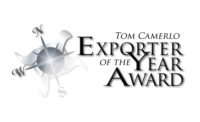Proliant Dairy Ingredients is the 2020 Exporter of the Year
The whey permeate company blazed trails to China and other global markets, creating new opportunities for the US dairy industry.










Proliant Dairy Ingredients has built a growing international business focused exclusively on whey permeate — an ingredient that turns what was once considered dairy waste into a global treasure exported to more than 30 countries.
For this and other contributions to the U.S. dairy industry, Proliant is the Tom Camerlo Exporter of the Year. The award is presented by Dairy Foods magazine and sponsored by the U.S. Dairy Export Council (USDEC) in honor of Camerlo, a former USDEC chairman.
With headquarters in Ankeny, Iowa, Proliant has become the world’s No. 1 processor of whey permeate, a rising value-added star of the U.S. dairy ingredients portfolio. Proliant exports 70% of the permeate it makes.
Proliant’s plant in Melrose, Minn., runs 24 hours, seven days a week, and its $85 million plant that just opened in St. Johns, Mich., is the world’s largest permeate drying facility.
The future looks even brighter since USDEC successfully worked with Proliant and others for the Chinese government to approve imports of permeate for human consumption. The May 15 announcement was a culmination of a decade of behind-the-scenes work and marked only the second time the Chinese government developed a new standard for a product that did not previously exist in China.
The result of that patient work: an opportunity for Proliant and the entire U.S. dairy industry to build a completely untapped market with long-term potential. The United States already leads the world in permeate production — with a market share of about 60% — and has the capacity to grow.
A long list of achievements
In a letter sent to Proliant CEO Mike Matter, Dairy Foods magazine cited the achievements that made Proliant the 2020 Exporter of the Year. The list included:
- A years-long commitment to developing value for the whey stream in dairy production.
- Extensive whey permeate export activities (to 30-plus global destinations).
- Strong, consistent commitment to quality — not just in products, but also in customer support.
- Exceptional research and development (R&D) via Proliant’s parent company, Lauridsen Group Inc. (LGI), with export customers allowed to use LGI’s $10 million laboratory, test kitchen and pilot plant, which are staffed by a highly experienced global team of experts.
- A technical staff that regularly travels to over 30 locations worldwide to work with customers developing new permeate-containing formulations.
- Active participation on the executive boards of USDEC and other national dairy organizations to help expand demand for U.S. dairy products.
- Work on trade policy issues so the U.S. dairy industry can compete on a level international playing field.
Dairy Foods editor-in-chief, Kathie Canning, presented the 2020 Exporter of the Year honor to Proliant on Oct. 15, 2020, during USDEC’s annual fall meeting.
Riding `the whey revolution’
It wasn’t long ago when whey, one of the most versatile and valued ingredients in the food and beverage industry, was a mostly untapped coproduct of cheesemaking. Whey was sold off to farmers to feed their livestock and spread on fields. A lot of whey was thrown away.
As cheese production grew, the question of what to do with whey became more challenging, because every pound of cheese creates 9 pounds of liquid whey.
Enter what some call “the whey revolution.”
With help from the dairy checkoff program through Dairy Management Inc. and The National Dairy Council, food scientists discovered how to capture valuable ingredients from the whey stream. One such ingredient is whey permeate (also called dairy product solids, deproteinized whey or modified whey).
Whey permeate is a dairy ingredient made after concentrating and separating whey’s protein and other solids, creating a high-lactose, soluble and versatile component that provides unique functionality in a wide variety of products.
Most permeate has historically been sold for feed, as it’s proven to improve the growth and health of piglets. However, whey increasingly is used to enhance the nutritional value and taste of a wide range of human foods such as hummus, pizza crust and brownies.
“There was a time when nobody knew what whey was,” says Gabriel Sevilla, vice president of global sales and marketing, Proliant. “No one knew what to do with it. For more than 20 years, we have been informing the public about the benefits of whey.
“Our challenge now is to inform our customers that permeate is part of the whey portfolio, and that it’s a cost-effective, high-quality ingredient with excellent applications and functionality, not just for feed, but for food use as well,” he adds.
Big investments in permeate
From 1991-2004, Proliant partnered with Hilmar Cheese to build a California manufacturing facility to produce whey proteins and lactose. The joint venture resolved a waste issue and developed a market for high-quality dairy proteins.
In 2008, Proliant made a decisive pivot to permeate when it commissioned its state-of-the-art whey permeate processing facility in Melrose, Minn., right next door to a Land O' Lakes cheese plant. The visionary objective was to produce the highest-quality whey permeate and develop demand for permeate food applications.
The key was to demonstrate the value and functionality of a whey coproduct considered for years to be only an animal feed ingredient. Proliant manufactures VersiLac: a high-quality, cost-effective, soluble dairy product solids (whey permeate) that is useful for a variety of food applications.
Permeate ticks all the right boxes for food formulators: versatile, functional, economical, clean-label friendly and nutritionally advantageous. The global number of new product introductions using permeate have soared 104% in just five years, reaching a record 531 in 2019, according to USDEC and Innova Market Insights.
The Proliant Melrose facility now produces 45,000 metric tons of whey permeate per year, exporting over 70%.
The Proliant plant in St. Johns, Mich., opened in August and is the world’s largest permeate drying facility. It can process 400,000 pounds of whey permeate per day (65,000 metric tons of finished product per year). Proliant invested $85 million in the plant, which adjoins the Glanbia Nutritionals, Dairy Farmers of America and Select Milk Producers new joint-venture, large-scale cheese and whey production facility.
You could say that if exporting global dairy ingredients were a poker game, Proliant has bet everything on what it believes to be a hot hand: permeate.
“We are the only company in the world that makes all of our money on permeate,” says Sevilla. “We have nothing to fall back on. That’s why we offer the highest-quality permeate with the best available technical support.”
Breakthrough in China
A breakthrough for the U.S. dairy industry occurred in May when 10 years of behind-the-scenes work by USDEC culminated with China officially approving permeate consumption for humans. Remarkably, the approval came when trade tensions between China and the United States were at a high pitch.
The green light opens a market of 1.4 billion people to permeate at a time when China is enthusiastically embracing dairy products and ingredients not present in the traditional Chinese diet.
It will take time to build demand. For example, Chinese food manufacturers must integrate permeate into their formulations. But Proliant has demonstrated it knows how to wait for long-term investments to pay off.
The company’s three biggest strengths, according to Sevilla, are a high-quality product supported by a skilled team, superb technical support featuring an R&D center, and patience.
“Maybe the third strength is the most important,” Sevilla says.
This patience, combined with other attributes, earned Proliant the title of 2020 Exporter of the Year.
Now in its 15th year, the award goes to a U.S. dairy supplier exemplifying leadership in advancing U.S. dairy exports, demonstrating a commitment to export market development while making exports an integral part of overall growth strategy.
Some previous winners (chronicled on the USDEC website) include BelGioioso (2019), Milk Specialties Global (2018), Sartori (2017), Swiss Valley Farms (2016) and California Dairies (2015).
Looking for a reprint of this article?
From high-res PDFs to custom plaques, order your copy today!










